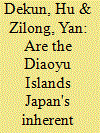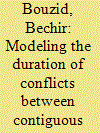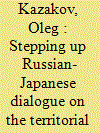|
|
|
Sort Order |
|
|
|
Items / Page
|
|
|
|
|
|
|
| Srl | Item |
| 1 |
ID:
130613


|
|
|
|
|
| Publication |
2014.
|
| Summary/Abstract |
"Historians believe that historical essays have nothing to do with the science of history and are actually harmful. Indeed, authors of such essays, whether intentionally or unintentionally, leave traces of themselves and their time. The same is true of editorials and reviews found in today's newspapers." ' The Origins of the Japan-China Territorial Issue, a new book by Mr. Murata Tadayoshi, an honorary professor at Japan' s Yokohama National University is also an example of what the Contemporary Historian, Mr. Chen Yinke, was referring to in the above. It is common knowledge that after Japan's Noda cabinet adopted its "nationalization" policy over the Diaoyu Islands on September ll, 2012, the Sino-Japan relationship began a downward spiral, while rivalry between non-govemment groups from both nations escalated. The Diaoyu
Islands dispute has become a hot topic for both the media and academia. Among the many works on the topic, Professor Murata's is quite unusual. While tensions remain high between China and Japan, his book carries an impressive argument as shown by work's subtitle-FaZsz?ed Facts in Japanese Government Papers. The cover of the book also features the question--"Are the Diaoyu Islands an inherent part of Japan's territory?"
|
|
|
|
|
|
|
|
|
|
|
|
|
|
|
|
| 2 |
ID:
128949


|
|
|
|
|
| Publication |
2014.
|
| Summary/Abstract |
Several studies have devoted considerable energy toward explaining the occurrence of international conflicts between contiguous states. Despite the well-developed multidisciplinary approaches analyzing militarized disputes, which have predominately focused on studying the geographical dimension as an additional explanatory predictor of rivalry disputes, only very few research papers have considered modelling the duration of conflicts between neighbouring states. Using the event history analysis, we propose, rather than investigating the standard theoretical questions of why neighbouring states do fight each other, or alternatively, what factors commonly influence the dispute outcomes between those rival countries, instead to answer the question: Once it breaks out, what role does the geographic proximity of opponent states play when interacting with other factors, extending or conversely shortening the crisis period? One of the most relevant insights of the present work is that disputes that occur between adjacent countries tend to be shorter when joint democracies are involved, and when countries are dependent economically on each other. The presence of a territorial issue at stake or a long history of hostility over disputed areas tends to prolong the tension period as those disputes often include nationalism dimensions that increase the difficulty of reconciling the divergent views on the issues at stake. On the contrary, the present research does not provide strong support for some of the theoretical suggestions formulated by certain scholars regarding the positive correlation between the nature of opposing powers and the duration of conflict between neighbours.
|
|
|
|
|
|
|
|
|
|
|
|
|
|
|
|
| 3 |
ID:
166015


|
|
|
|
|
| Summary/Abstract |
The stepping up of Russian-Japanese relations initiated in 2016 by RF President Vladimir Putin and Japanese Prime Minister Shinzo Abe has led to the next stage of discussing the need to conclude a peace treaty to resolve the territorial issue. Japan has traditionally continued to insist on "the return of the Northern Territories." However, the position of Moscow, which favors signing a peace treaty based on the Soviet-Japanese Joint Declaration of 1956, evokes a negative reaction, primarily among the Russian public.
|
|
|
|
|
|
|
|
|
|
|
|
|
|
|
|
|
|
|
|
|